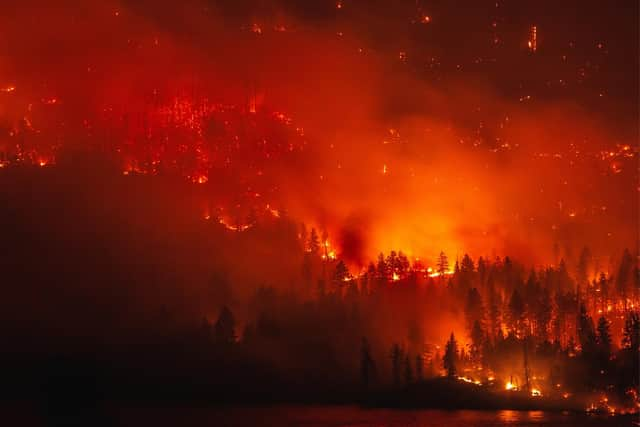IPCC climate change report: what are the main findings of the UN climate report? Will the UK be affected by 'code red' climate crisis?
The United Nations body responsible for exploring and studying climate change has published its latest findings as the effects of global warming, heatwaves and flooding continue to be seen around the world.
With wildfires currently raging in Turkey, Greece and California, and European countries like Germany and Belgium recently hit by unprecedented inland flooding, the IPCC’s Sixth Assessment Report into the physical scientific basis of climate change has been described as “code red for humanity” – with temperatures and sea levels soaring in since the 1970s.
Here’s what you need to know.


What does the IPCC report say?
Advertisement
Hide AdAdvertisement
Hide AdAccording to the authors of the UN’s Working Group 1 Report, the IPCC’s prediction in 2018 that global temperatures would increase by 1.5C has been confirmed – with global temperatures increasing by 1.5C by 2040.
This considerable rise in global temperatures could take place even earlier if emissions are not lowered, scientists warn.
The report also found that land surface temperatures had soared in recent years – with global land surface temperatures more than 1C hotter between 2011 and 2021 than they were from 1850 to 1900.
This comes as the report also states that human influence has grown as a factor causing global warming and climate change since the 1970s, with human activity thought to be behind rising sea levels occurring as a result of glacier melt and sea ice loss.
Arctic sea ice is currently thought to be at its lowest level in more than 1000 years.
IPCC scientists also concluded that the intensification of global temperatures and water cycles will lead to more seismic changes in the climate system, with more heatwaves, marine heatwaves, precipitation, droughts and tropical cyclones to be expected worldwide.
How will the UK and Europe be affected by climate change?
The IPCC has outlined several consequences of rising temperatures and sea levels for Europe, with scientists having ‘high confidence’ that the region will experience more frequent and intense heatwaves, less cold spells and frost in winter and increased coastal flooding as a result of retreating European shorelines.
Alongside more extreme sea level events and relative sea level rises impacting everywhere in Europe except for the Baltic Sea, higher levels of precipitation are likely to be seen across northern Europe in the UK, Ireland and Scandinavia.
Advertisement
Hide AdAdvertisement
Hide AdIPCC scientists suggest with ‘medium confidence’ that more surface water and flash flooding as a result of extreme rainfall (pluvial flooding) could be seen in northern European countries such as the UK.
If global warming increases by 2C, an increase in severe windstorms could be seen in Europe as well.
Why has the report been called ‘code red for humanity’?
In a statement issued on Monday, UN Secretary-General António Guterres called the IPCC’s climate science report “code red for humanity”, stating that without immediate and tough action against carbon emissions, pollution and deforestation the planet will be plunged into further danger.
“The alarm bells are deafening, and the evidence is irrefutable: greenhouse gas emissions from fossil fuel burning and deforestation are choking our planet and putting billions of people at immediate risk,” Mr Guterres said.
"Global heating is affecting every region on Earth, with many of the changes becoming irreversible.
“The internationally agreed threshold of 1.5 degrees Celsius is perilously close.”
The Secretary-General added that the findings of the IPCC report highlighted the importance of the upcoming international climate conference set to be held in Glasgow, with preparations for COP26 in November well underway.
“We are already at 1.2 degrees and rising,” Mr Guterres said.
“Greenhouse gas concentrations are at record levels.
Advertisement
Hide AdAdvertisement
Hide Ad“Extreme weather and climate disasters are increasing in frequency and intensity.
"That is why this year’s United Nations climate conference in Glasgow is so important.”
A message from the Editor:
Thank you for reading this article. We're more reliant on your support than ever as the shift in consumer habits brought about by coronavirus impacts our advertisers.
If you haven't already, please consider supporting our trusted, fact-checked journalism by taking out a digital subscription.
Comments
Want to join the conversation? Please or to comment on this article.